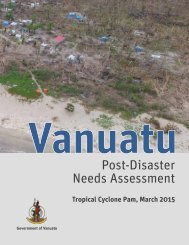Fiji
yqgk302EGjo
yqgk302EGjo
You also want an ePaper? Increase the reach of your titles
YUMPU automatically turns print PDFs into web optimized ePapers that Google loves.
FIJI Post-Disaster Needs Assessment<br />
Social Impact of Damage and Losses<br />
A significant number of manufacturing and retail operations located in the affected zone reported temporary closure for a<br />
few days following TC Winston as a result of intermittent electricity and water supply outages, and the limited accessibility<br />
of staff and customers to places of business. Wholesale operators were largely spared as they operate from outside<br />
the TC Winston-affected zone. Employees were temporarily laid off and livelihoods impacted as alternative sources of<br />
income were limited. Furthermore, most of these workers also suffered damage to their houses and subsistence crops and<br />
livestock, which compounded the impact. In particular, survey data collected found a total of 554 short-term jobs in the<br />
manufacturing sector were lost within two weeks following the cyclone. In general, for each person who lost a job, at least<br />
two to three other people presumably would be affected by this loss in their household. Alternative job opportunities were<br />
limited given the broader impact of TC Winston, which would have exacerbated the household-level impact.<br />
Around 43 percent of micro and small enterprises, which contribute to both manufacturing and commerce activities, have<br />
suffered extensive damage and losses. Of this, 38 percent are female entrepreneurs who had engaged in some form of<br />
business activities. Both women and men have sustained damage to their businesses and will continue to incur losses,<br />
particularly losses in food processing enterprises arising from primary production losses sustained in the agriculture sector,<br />
and livestock and fisheries subsectors (refer to Section 3.1.1 for more information). As savings are diverted towards<br />
meeting basic household needs and home reconstruction, there may not be enough capital available to restore businesses.<br />
Similar challenges can be anticipated for cooperatives, which along with micro and small business enterprises, employ a<br />
high number of women due to the flexibility and low-entry capital requirements.<br />
Cooperatives are also reportedly sustaining damage to assets and losses in revenue. Some cooperatives provided ecotourism<br />
services and recovery will depend not only on reconstruction of assets but broader recovery in visitor arrivals<br />
and the tourism sector. (Refer to Section 3.1.3 of this report for more information on damage and losses to the tourism<br />
sector). Recovery for SMEs and cooperatives could be further impeded due to limitations on accessing the loans and<br />
micro-finance that may be needed to inject cash into their businesses to help post-disaster recovery. Limited access to<br />
loans may be a bigger challenge for women, as they often have difficulty in accessing financial services under ordinary<br />
circumstances. Targeted intervention to support cooperatives and SMEs is, therefore, important to ensure women are not<br />
left behind in the recovery process. Recovery efforts should focus on facilitating access to soft credit and low interest rates<br />
for SMEs. Medium- and long-term skills development and direct access to external markets are also needed for women<br />
entrepreneurs to reduce their reliance on local tourist markets and to enhance their resilience against future disasters.<br />
Recovery and Reconstruction Needs for the Commerce and Manufacturing Sector (F$61<br />
million)<br />
Private businesses in the commerce and manufacturing sector have been affected by TC Winston, particularly in terms<br />
of sugar manufacturing. The total recovery and reconstruction costs are estimated at F$61.3 million 60 and considerable<br />
support to avoid a prolonged reduction in the country’s production capacity is needed. Reconstruction and recovery will<br />
need to rely on a combination of subsidised loans, commercial finance, insurance, grants, private savings and exemptions.<br />
The weight to be given to the respective instruments and their detailed design will be decided upon further assessment.<br />
Development partner support will be necessary in most parts. In addtion, the financial and insurance sectors will need to<br />
play a proactive role, with, for example, lodging and processing insurance claims in a timely manner.<br />
A number of specific recovery needs have been identified by the sugar stakeholders, in particular, repair of sugar processing<br />
equipment and vessels, and electrical and electronic control facilities. Further repairs of roofs, civil works and administrative<br />
offices will be carried out in 2017. The Penang Mill may be dismantled and options on a way forward for the mill is yet to be<br />
determined. Stoppage of the Penang Mill will have a direct consequence on transport costs to the <strong>Fiji</strong> Sugar Corporation<br />
with an additional F$25/tonne expected to cart cane from from the Penang to the Rarawai Mill in Ba. In addition, railway<br />
and road infrastructure for cane delivery requires upgrades.<br />
The short-term support identified by the commerce and manufacturing sector should not deviate attention from pursuing<br />
the long-term policy priorities identified by the government for developing these sectors as identified by the National<br />
Development Plan, the 2016 National Budget Strategy and the 2015 Trade Policy Framework. Longer-term support directly<br />
linked to coping with risk from natural disasters needs to be aligned with the National Development Plan and associated<br />
government strategies.<br />
60<br />
Damage and losses in the sector multiplied by a factor as per the Damage and Loss Assessment methodology and, based on stakeholder<br />
consultations, sugar sector specific recovery needs have been incorporated. The BBB principle has been incorporated where appropriate.<br />
Estimates do not include insurance claims, which were not processed at the time of the assessment.<br />
56 Tropical Cyclone Winston, February 20, 2016



